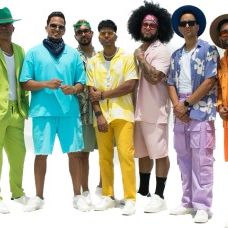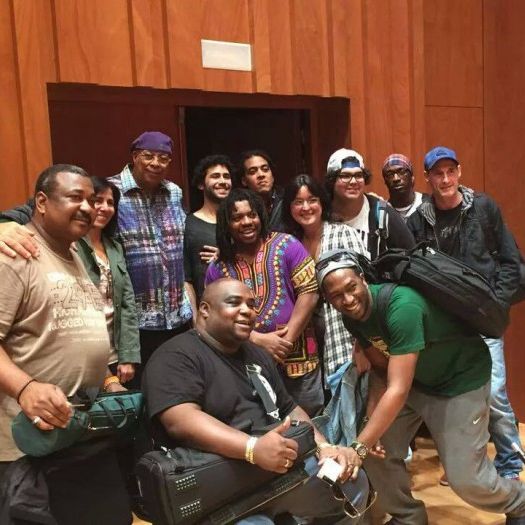Africando @ Dakar Sénégal
Africando is the reference in Afro-Cuban music. Headed by Ibrahima Sylla, Boncana Maïga and a core of talented musicians, the group has constantly brought out the links between African and Cuban rhythms.
The group Africando was set up in Dakar in 1992 through the impetus of the Senegalese producer, Ibrahima Sylla, and the Malian flautist and arranger, Boncana Maïga. As the main Afro-salsa group in West Africa, Africando brilliantly relates the love story that links son, bolero, guaracha and cumbia to African rhythms.
Star singers
Back in the thirties, Cuban sailors were already taking lost rhythms back over the seas. By the time many African countries were gaining independence in the early sixties, their capital cities were alive with the sound of Cuban and Porto-Rican records. At that time, in Dakar, there was a rash of Afro-Cuban groups. They didn’t record, though, and local bands like Star Band simply played in clubs.
Ibrahima Sylla, who was passionate about Cuban music and the owner of thousands of records, decided to record a Senegalese group for the first time playing salsa – Baobab. Over the following years, Ibrahima Sylla was to become one of the great West African producers.
Around the same time in Mali, several young musicians set off to study in the Havana Music School. Among them was Boncana Maïga. From 1963 to 1973, he lived and studied in Havana, where he learned about melodies and musical arrangements. His group, Las Maravillas de Mali, became a reference in Cuba before finding success in Mali. He created the Ivory Coast Radio’s orchestra in Abidjan and participated in the African tour of the Fania All Stars, the mythical combo of New York salsa.
In the early 1990s, Ibrahima Sylla and Boncana Maïga, who had become well-known personalities of the African music scene, decided to get Afro-Cuban splendour back on its feet, and they recorded an album in New York. At first, the group was a 100% Senegalese vocal trio comprising Médoune Diallo, Pape Seck and Nicolas Menem. Each member had been an active contributor to the growth of the Afro-Cuban style in the 1970s.
Médoune Diallo, who had been running a grocery store from 1978 to 1993, was best known for his participation in Ibrahima Sylla’s first production, Orchestra Baobab, one of the biggest successes of the seventies. Pape Seck was one of the main singers of Star Band, which he left in the mid-seventies to found his own group, Number One. In 1974, his track “Sama Thiely”, later covered by Africando, was the longest runner on the Radio Dakar hit parade. Mbalax, which has since become the Senegalese music style par excellence, has been attributed to Pape Seck. He composed more than half of the tracks of the first Africando albums. Nicolas Menem started by playing in the orchestra of the small town of Fatick, in the Sine Saloum Delta, then in Number One in Dakar, followed by the just-as-famous Super Etoile. Summoned by Ibrahima Sylla, he left the National Orchestra to join Africando.
"El son" Cuban style, sung in Wolof
The first album, “Trovador” was recorded in New York in 1993, with Boncana Maïga arranging all the tracks. Some of the titles, like Pape Seck’s "Médoune Khoule" brought the group a phenomenal success in Africa, as well as in Cuba, Porto Rico, New York and Miami. In 1993, Africando received the Africar Music Awards in Abidjan, chosen by an international jury and awarded to African and Caribbean light music. The second album, “Sabador”, released in 1994, was unanimously chosen. Africando’s success was the result of their adaptation of songs from Cuba (Benny Moré, Noro Morales, Matamoros), Mexico and Porto Rico, sung in Bambara, Wolof and Serer-Sin, and their marriage of West-African instruments with congas and brasses. Some of Pape Seck’s compositions, like "Yaye Boye", brought the group legendary status.
In February 1995, an ailing Pape Sérigne Seck died at home in Dakar. The whole of Senegal mourned one of its best musicians, with national radio and television paying homage and tens of thousands of fans following his coffin to the Dakar cemetery.
New musical colours
The Africando line-up found a choice replacement in Gnonnas Pedro, from Benin. In the sixties, he had the whole of Cotonou dancing with his group, Gnonnas Pedro y sus panchos Cotonou, finding huge success with “La combinacion”, “El Cochevivo” and “Yo prefiero el son”. A native of Mono, in the south west of Benin, he brought to the combo the spirit and rhythms of vodun, practised in the Gulf of Guinea. He introduced the use of bells into Africando, as well as certain particularly vodun percussions and rhythms, which paradoxically drew the combo closer to Cuba. The 3-2 rhythm that is typical of Afro-Cuban music from the end of the 16th century in Santiago de Cuba, the black town of the island, has its origins in the vodun rhythms of South Benin, Togo and Nigeria.
In 1997, the group brought out “Gombo salsa”, followed by “Baloba!” one year later, which sold 10,000 copies in France in the ten days following its release. Recorded in New York, the album includes the guest artists, Eugène Shoubou from the Haitian group, Tabou Combo, the Guinean, Sékouba Bambino, and another prince of Afro-Cuban nights in Dakar, Labah Sosseh. The group did some daring but successful covers of the Khaled’s “Aïcha” and "la Vie en Rose" by Edith Piaf. Ronnie Barro, an American, joined the band in 1998, as did Sékouba Bambino, formerly of Bembeya Jazz, in 1999.
In 2001, the group’s fifth album, “All Stars Betece”, once more invited the big names of the Afro music scene to be guests: the Congolese, Lokua Kanza, Amadou Balaké from Burkina Faso, the Malian, Salif Keita, who resuscitates "Notman", a track recorded in 1973 with the Ambassadeurs, Thione Seck from Senegal, Hector Casanova from Porto Rico, and Koffi Olomidé, who sings to a Portorican rhythm. It was a big success. The same year, a live double album came out with the group’s hottest scenes.
The album “Martina”, released in 2003, marked a turning point. Boncana Maïga, the original arranger, is less present on the album. The saxophonist and singer, Gnonnas Pedro died in Cotonou in August 2004, sending the pan-African set-up into mourning once more.
Africando’s seventh album, "Kékutuba", which means “back to our roots” in Yoruba, came out in November 2006, and is dedicated to the musician. The album aims to mirror the descargas of the 1940s, somewhere between jazz and salsa, but also makes room for other musical colours: Alfred Rodriguez, the Cuban pianist, and Nelson Hernandez, a Venezuelan living in New York, bring to the group the latest sounds of New York salsa. On the Senegalese side, the album gives room to the voices of Pascal Dieng and Bass Sarr, stars of the new Dakar salsa scene, as well as to Ladia Mansour, the son of Médioune Diallo, one of the last founding members of Africando.
In 2007, the group made a twenty-date tour taking in France, Belgium, the Netherlands, Switzerland, Germany, Norway, the UK and Austria, and went to Morocco to perform in the Timitar d’Agadir festival. In April 2008, they crossed the Atlantic to take part in Montreal’s international festival, Nuits d’Afrique, then performed in Guadeloupe in June 2009.
2013: "Viva Africando"
After four years out of the limelight, Africando were back in the headlines in November 2013 with their album “Viva Africando”. This time round, the musicians got together in Paris since, following the disruptions in Mali in 2012, the arranger Boncana Maïga was not authorised to enter the United States.
Some new faces joined the collective, like the Senegalese musician James Gadiaga, from the Royal Band de Thiès, the seventy-year-old Congolese, Lokomba Nkalulu, former member of Grands Maquisards, and Cap Verdean René Cabral, the iconic singer from the Cabo Verde Show.
The album was haunted by the memory of absent friends, like "Es para ti Gnonnas", for the Beninese Gnonnas Pedro, and a track interpreted by Raymond Fernandez, who died just before the album, "Betece". The prestigious Spanish Harlem Orchestra composed a special tribute to Africando. The group performed live in Paris in December of that year.
Creation date : 1922 Country : Senegal Language : Wolof Category : Composer / Male Artist Style of music : Salsa Members : Médoune Diallo, Pape Serigne Seck, Nicolas Menem, Sekouba Bambino, René Cabral, James Gadiaga, Lokomba Nkalulu
| plaats | Dakar Sénégal | |
 Artiesten Internationaal Artiesten Internationaal |
||
| zie ook |
http://www.rfimusique.com/artiste/salsa/africando |
Overzicht Latin artiesten
Romeo Santos
Geboren in the Bronx op 21 juli 1981, startte hij zijn loopbaan als zanger in het koor van de plaatselijke kerk, om verv..
Grupo Extra
Dit Dominicaanse gezelschap draait rond rapper `El Doggy` en zanger `Diddy Cruz`. In hun korte muzikale carrière ..
Son Trompettiste Maite Hontele
Als jong meisje kreeg Maite Hontelé bij de fanfare een trompet in handen gedrukt: het was het begin van een carri..
Marc Anthony
Marco Antonio Muñiz (New York, 16 september 1968), beter bekend als Marc Anthony, is een Puerto Ricaans singer-so..
Ephrem J
Ephrem Jonathan Ocalia; artiestennaam Ephrem J werd geboren op 24 november 1984 in Curaçao. Zijn vader, Ephrem Oc..
Frank Reyes
Frank Reyes (geboren op 19 juni 1969), met als familienaam Francisco Reyes Lopez, is een van de meest bekende bachata ar..
Elvis Crespo
Elvis Crespo is de enige Latin artiest wiens Muziek letterlijk op de maan is gespeeld, en een tropisch nummer langer dan..
Alexander Abreu & Havana D` Primera
Alexander Abreu & Havana D’Primera keerden de populaire Cubaanse muziek ondersteboven, en claimden hun plek tu..
Natti Natasha
Latin artiest in de spotlight deze keer is Natti Natasha. In de latin wereld onder andere bekend door haar duet ”L..













